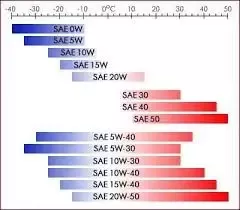When it comes to your vehicle’s engine, maintaining the proper levels and quality of coolant and oil is essential for optimal performance and longevity. However, what happens when coolant finds its way into the engine oil? Will this cause damage to your engine? Let’s explore this issue in more detail.
Understanding the Role of Coolant and Oil in Your Engine
Coolant, also known as antifreeze, is a liquid that helps regulate the temperature of your engine by absorbing heat and dissipating it through the radiator. Engine oil, on the other hand, lubricates the moving parts of the engine to reduce friction and wear. Both fluids play crucial roles in ensuring your engine runs smoothly and efficiently.
Potential Causes of Coolant in Oil
There are several reasons why coolant may mix with engine oil, with the most common being a leaking head gasket or a cracked engine block. When these components fail, they can allow coolant to seep into the oil passages, contaminating the engine oil. Other possible causes include a damaged cylinder head or a faulty intake manifold gasket.
The Effects of Coolant in Oil
Having coolant in the engine oil can have detrimental effects on the engine’s performance and longevity. Coolant is corrosive and can damage engine components, such as bearings, pistons, and camshafts. Additionally, the presence of coolant in the oil reduces its lubricating properties, leading to increased friction and wear on engine parts.

Credit: www.machinerylubrication.com
Signs of Coolant Contamination in Oil
It is essential to be aware of the signs that indicate coolant has contaminated the engine oil. Some common symptoms include:
- White or milky appearance of the oil on the dipstick
- Overheating of the engine
- Increased coolant consumption
- Thick sludge buildup in the engine

Credit: www.reddit.com
Effects of Driving with Coolant in Oil
Continuing to drive your vehicle with coolant in the engine oil can lead to severe engine damage. The corrosive nature of coolant can cause premature wear of engine components, leading to costly repairs or even engine failure. It is crucial to address the issue promptly to prevent further damage.
Steps to Take if Coolant is Found in Oil
If you suspect that coolant has mixed with your engine oil, it is recommended to take the following steps:
- Stop driving the vehicle immediately
- Have the cooling system and engine inspected by a qualified mechanic
- Repair any leaks or damaged components causing the coolant contamination
- Flush the cooling system and replace the engine oil and filter
Preventing Coolant Contamination in Oil
Regular maintenance and inspections are key to preventing coolant from mixing with engine oil. Be sure to check for any signs of leaks, such as puddles of coolant under the vehicle or white smoke from the exhaust. Additionally, following the manufacturer’s recommended coolant and oil change intervals can help maintain the health of your engine.
Conclusion
In conclusion, having coolant in the engine oil can indeed damage your engine if left untreated. It is crucial to address any coolant contamination promptly to prevent costly repairs and ensure the longevity of your engine. By staying vigilant and conducting regular maintenance, you can keep your engine running smoothly and efficiently for years to come.


